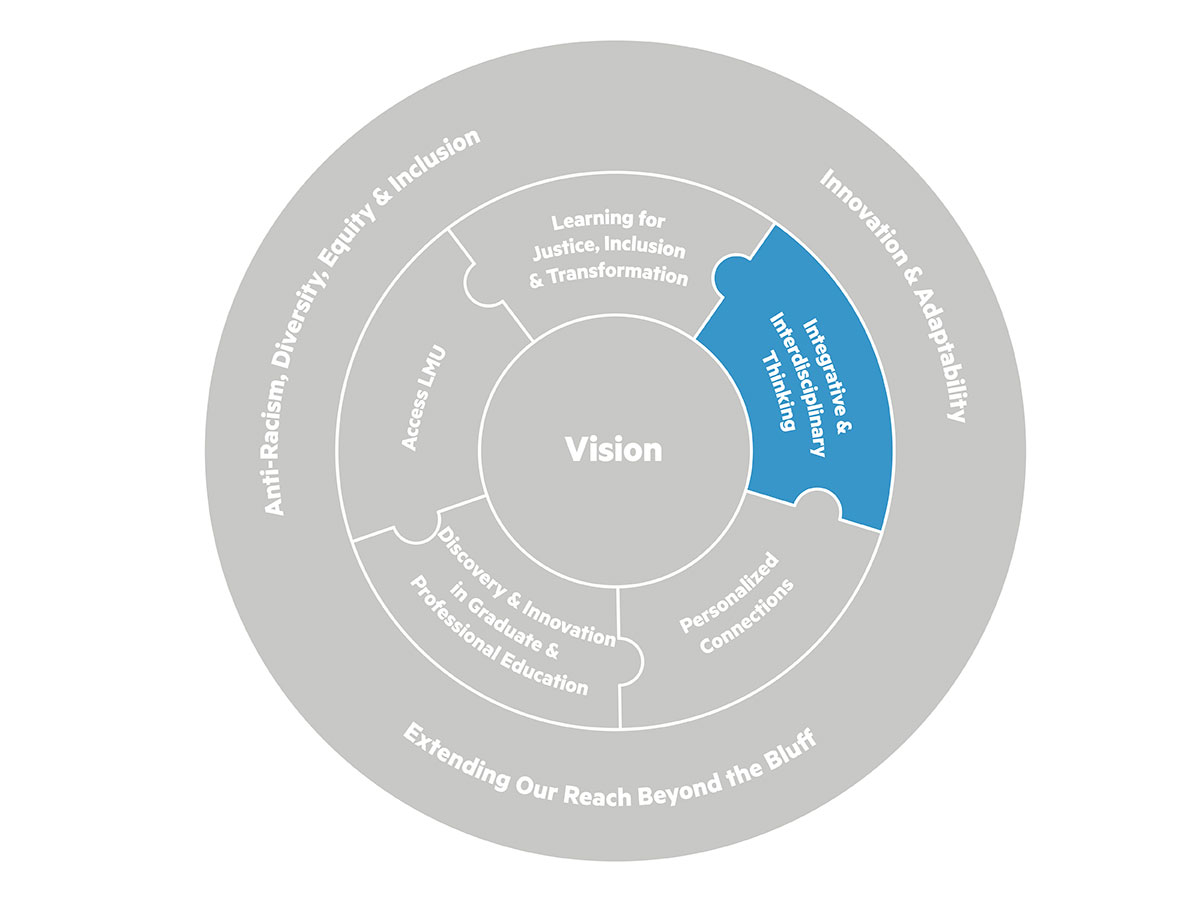Goal
LMU will establish a distinctive academic specialization in interdisciplinary and integrative thinking approaches that prepares students to use multi-dimensional analysis, critical reasoning, and creative problem solving.

Rationale and Strategic Approach
Catholic higher education has long embraced an integrative conception of reason that understands all branches of human knowledge as connected through God as the ultimate source of truth. The wisdom of that approach is now clear, as we continue to discover that the world's most challenging problems can only be solved by transcending the current boundaries that separate forms of human knowledge and combining the disciplines of rational discourse with the distinctively human capacities for creativity and ethical discernment. In a world where more and more functions will be performed by automation or artificial intelligence, there will be increasing need for those distinctively human virtues of mind and character that liberal arts higher education, especially in the Catholic tradition, has always emphasized. LMU has the opportunity to distinguish itself as a university that prepares its students for this ever-evolving future by foregrounding interdisciplinary and integrative thinking as the hallmark of an LMU education. By leveraging existing interdisciplinary strengths, such as the university's liberal arts-grounded core curriculum, as well as expanding interdisciplinary offerings in graduate and professional fields and recruiting faculty in areas of interdisciplinary strength, LMU can affirm its commitment to this approach. Likewise, by further extending opportunities for global- and local-engaged learning experiences and by intentionally positioning ourselves as leaders in educating for imagination, creativity, and ethical discernment, LMU can attract and form students with the integrative thinking capacities required to solve the world's biggest challenges and while also enhancing their opportunities for career success and personal impact.
-
Actions
- Strengthen the educational impact of the interdisciplinary dimensions of the core curriculum, including consideration of an Interdisciplinary Academy/Academy of the Core.
- Leverage the flexibility of the University Honors Program curriculum as a laboratory for innovation in interdisciplinary teaching and learning.
- In consultation with faculty, develop a university-wide framework to assess and assure interdisciplinary and integrative thinking in learning outcomes, curricula, and pedagogy.
- Expand usage of pedagogies, curricular content and co-curricular experiences that promote interdisciplinary and integrative thinking, including imagination, creativity, and ethical discernment.
- Expand usage of pedagogies, curricular content and co-curricular experiences that leverage interdisciplinary and integrative forms of experiential and engaged learning, project-based learning, and reflective learning, especially those that engage with challenging problems that require a multi-disciplinary focus.
-
Actions
- Explore and recommend a timeline to create and launch selected new interdisciplinary degree programs.
- Explore and propose potential academic concentrations and credentials that recognize thematic or skill-based multi-disciplinary experiences at a smaller scale than a traditional major or minor.
- Devise a plan to expand and support opportunities for collaborative teaching.
- Create or enhance spaces, modes, and partnerships to promote interdisciplinary research ideation and intellectual community.
- Align capital fundraising priorities to support the need for a "creativity-ready" campus, including additional spaces to support programs in fine arts, engineering, and digital and immersive learning.
- Pursue fundraising opportunities to support endowed faculty positions with interdisciplinary expertise in select fields.